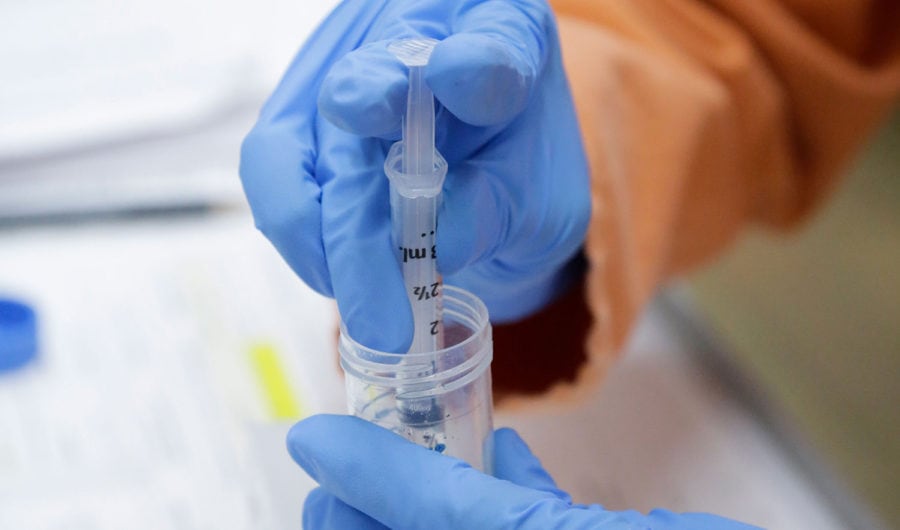CSIRO begins testing COVID-19 vaccines

CSIRO, Australia’s national science agency, has commenced the first stage of testing potential vaccines for COVID-19. The testing is underway at CSIRO’s high-containment biosecurity facility, the Australian Animal Health Laboratory (AAHL) in Geelong, Melbourne.
To prepare for disease outbreaks, last year CSIRO partnered with the Coalition for Epidemic Preparedness Innovations (CEPI), a global group that aims to derail epidemics by speeding up the development of vaccines.
In January, CEPI engaged CSIRO to start working on the virus SARS CoV-2, which causes the disease COVID-19. In consultation with the World Health Organisation, CEPI has identified vaccine candidates from The University of Oxford (UK) and Inovio Pharmaceuticals Inc. (US) to undergo the first pre-clinical trials at CSIRO, with further candidates likely to follow.
The latest milestone builds on CSIRO’s growing work to tackle COVID-19, which has included scaling up other potential vaccine candidates at its biologics production facility in Melbourne.
CSIRO Chief Executive, Dr Larry Marshall said: “Beginning vaccine candidate testing at CSIRO is a critical milestone in the fight against COVID-19, made possible by collaboration both within Australia and across the globe.”
“CSIRO researchers are working around the clock to combat this disease which is affecting so many – whether it’s at the Australian Animal Health Laboratory (AAHL) or at our state-of-the-art biologics manufacturing facility – we will keep working until this viral enemy is defeated,” Larry said.
CSIRO is testing the COVID-19 vaccine candidates for efficacy, but also evaluating the best way to give the vaccine for better protection, including an intra-muscular injection and innovative approaches like a nasal spray.
Professor Trevor Drew OBE, is Director of AAHL and leading CSIRO’s COVID-19 virus and vaccine work.
“We have been studying SARS CoV-2 since January and getting ready to test the first vaccine candidates as soon as they are available,” Trevor said.
“We are carefully balancing operating at speed with the critical need for safety in response to this global public health emergency.”
CSIRO has a long history of developing and testing vaccines since the opening of the AAHL in 1985. It is the only high biocontainment facility in the southern hemisphere working with highly dangerous and exotic pathogens, including diseases that transfer from animals to people.
“Tackling disease and supporting better health outcomes takes a one-health approach,” Larry said.
“In 2016 CSIRO created the Health and Biosecurity research group who work with our scientists at AAHL to tackle our national and international health and biosecurity challenges together, so we can better protect the health of our people, environment, agriculture and industries and our way of life.
“This, combined with our data science and manufacturing capability in our biological production facility, means we were well prepared to help Australia in One Health with disease identification, prevention and management, to deliver the real world solutions that our nation expects from science.”
CSIRO’s COVID-19 research so far
Current rapid work on COVID-19 spans virus and vaccine:
- CSIRO was the first research organisation outside of China to generate sufficient stock of the virus — using the virus strain isolated by the Doherty Institute — to enable pre-clinical studies and research on COVID-19.
- CSIRO successfully established a biological model in February 2020, the first in the world to confirm ferrets react to SARS-CoV-2 (the virus that causes COVID-19). Researchers have quickly progressed to studying the course of infection in the animals – a crucial step in understanding if a vaccine will work.
- CSIRO researchers confirmed, after studying SARS CoV-2’s genomic sequence that the virus is presently changing into a number of distinct ‘clusters’ and are now starting to look at how this may also impact on the development of a vaccine.
For more information on CSIRO’s COVID-19 work, visit: www.csiro.au/COVID-19
About CEPI
CEPI is an innovative partnership between public, private, philanthropic, and civil organisations, launched at Davos in 2017, to develop vaccines to stop future epidemics. CEPI has reached over US$750 million of its $1 billion funding target.
CEPI’s priority diseases include Ebola virus, Lassa virus, Middle East Respiratory Syndrome coronavirus, Nipah virus, Rift Valley Fever and Chikungunya virus. CEPI also invests in platform technologies that can be used for rapid vaccine and immunoprophylactic development against unknown pathogens (ie, Disease X). To date, CEPI has committed to investing over $456 million in vaccine and platform development.

